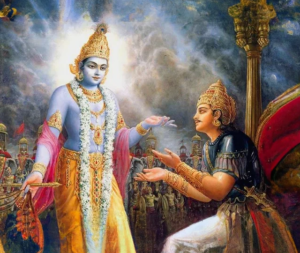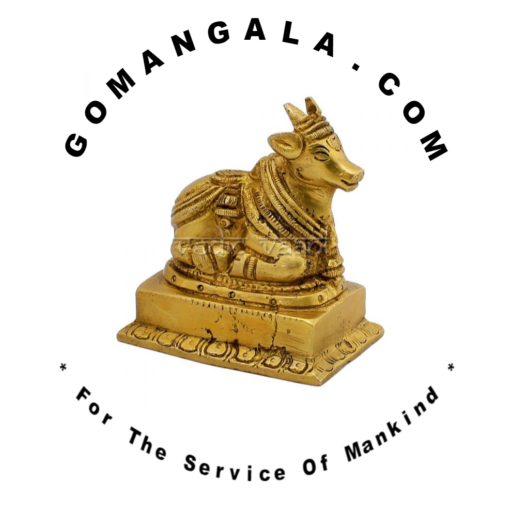Karna Vivada Parva or Karnopanivada Parva is the fifty fifth Upa Parva included in the fifth Maha Parva named as Udyoga Parva in Mahabharata.
The story of Mahabharata and the Bhagavata Purana were written by the sage Vyasa Maharshi. Vyasa was the teacher of Vaishampayana Rishi and Krishna was depicted as the incarnation of God Vishnu in both of them. In Purana, devotion to God was described as the main theme. Here in Mahabharata, Arjuna had been depicted as the main hero; he was the father of the grandfather of the listener of the story, Janamejaya and he was free to ask any doubtful queries in between the narrations of his ancestor’s life. After the actual events, more than one century time had already passed then, and the Ashwamedha Yaga was going on at the palace in the Town of Takshashila.
Kripa was the old family priest of Pandavas and Krishna instructed him to give good education to Pareekshit, then child, the Prince of Abhimanyu was being very young. Krishna blessed Kripa to be living always as a Chiranjeevi. After the great Mahabharata war, the palace at Hastinavati needed renovation and was getting it done slowly. The Dwapara Yuga had ended and after Krishna Niryana, Kaliyuga had started. Kripa had left for his penance at Himalaya in Badarikashram with Veda Vyasa Maharshi, after completion of his teachings to Pareekshit and installing him on the throne as king. Pareekshit had shifted his palace to Takshashila but died at the age of sixty.
Later, the young Janamejaya had assumed the kingship at Takshashila with the blessings of his people. After stopping the Sarpa Yaga, this Ashvamedha Yaga was started in this palace of Janamejaya at the Town of Takshashila. There was no animal sacrifice in that yaga, but this story of ‘Mahabharata’ was narrated by Rishi Vaishampayana, as a virtuous hearing to pass the holy time for the king and the Suta Puranikas of Naimisharanya had also attended the auspicious occacion.
Vaishampayana continued his narrations to Janamejaya as follows.

What Krishna discussed with Karna and how did Sanjaya narrate it to Dritarashtra?
After coming out of the court hall with Satyaki and Kritavarma, Krishna desired to ascend his chariot accompanying Karna and hence called him to come along with him. So Karna came and sat near Krishna on the chariot and started their discussions. Krishna told Karna about his birth stories and Karna agreed with him but also replied that the old events were known to him. Krishna requested Karna to join with Yudhishtira and start to rule as an Emperor. Yudhistira would be the prince and all Pandavas would be his servants. Being the eldest son of Kunti, he could shine as an Emperor in the whole world. He could lead a pleasant, glorious future life and avoid the war. Sanjaya told it to Dritarashtra later.
What was the answer of Karna to Krishna for his tempting offers?
दृतराष्ट्रकुले कृष्ण दुर्योधन समाश्रयात् । मया त्रयोदश समाभुक्तं राज्यमकण्टकं ॥
Karna addressed Krishna and started to speak. “In the leniency of Dritarashtra, with the leadership of Duryodhana, for the last thirteen years, I had experienced the pleasures of ruling without any problems”.
During these thirteen years, Duryodhana was living a luxury life and I was actually looking after the administrative matters, since Duryodhana was confident on my capacities and rulings. Hence even if the whole kingdom would be entrusted to me, I am bound to offer the same to Duryodhana as I am indebted to him. Since Krishna was aligned with Yudhishtira in the Great War, success would be finally following him but Karna had to sacrifice his life for Duryodhana as a sincere friend to him. The tempting offers of Krishna were politely rejected by Karna.
When was the war to be started as per Krishna and Karna’s discussion?
The coming eighth day was a black moon day. Krishna told Karna to bring his army of Duryodhana. On that day, he would have to face Yudhishtira’s army. But on that day, Krishna would not be holding any weapons. He would not be participating as a soldier. He would be directing the horses as the charioteer in the chariot of Arjuna. Krishna knew about the opinion differences between Karna and Bhishma but didn’t tell anything about it then.
After bidding good wishes, they departed. Karna went to his home. Krishna with Satyaki and Kritavarma returned to Upaplava after saluting Kunti. After reaching Upaplava, Krishna had requested with Yudhishtira to send Kritavarma back to Dwaraka and prepare his Narayani Sena, with consultations of his elder brother Balarama. On the side of Duryodhana, after the great Mahabharata war, Kritavarma was still alive.
What did Kunti tell to Karna and what was the result?
After Krishna left the house of Vidura, Kunti started thinking and on the following day, in the early morning, she met with Karna on the bank of River Yamuna. Kunti told Karna about his birth stories and Karna agreed with her, but replied that the old events were known to him. Kunti requested Karna to join with Yudhishtira and start to rule as an Emperor. Yudhistira would be the prince and all Pandavas would be his servants. Being the eldest son to her, he could shine as an Emperor in the whole world. He could lead a pleasant. glorious future life and avoid the war. But Karna told in reply, his teacher Parashurama had already explained him his past events and educated him, befitting to the son of Sun God, on the sky.
What was the answer of Karna to Kunti for her tempting offers?
Karna addressed Kunti and started to speak. In the leniency of Dritarashtra, with the leadership of Duryodhana, for the last thirteen years, he had experienced the pleasures of ruling without any problems.
During these thirteen years, Duryodhana was living a luxury life and he was actually looking after the administrative matters, since Duryodhana was confident on his capacities and rulings. Hence even if the whole kingdom would be entrusted to him he was bound to offer the same to Duryodhana as he had been indebted to him. Since Krishna was aligned with Yudhishtira, in the Great War success would be finally following him but Karna had to sacrifice his life for Duryodhana as a sincere friend to him. The tempting offers of Kunti were politely rejected by Karna.
Then, Kunti desired some promises from Karna as her son. Karna should not use an arrow weapon for more than once, was the first promise. The five sons of Kunti should be always alive, was the second promise. Karna agreed for her first promise unconditionally. But for her second promise, he started to argue and to explain. He told her he would not kill Yudhishtira, Bhima, Nakula and Sahadeva in the war. But he would try with Arjuna a martial hand in the war. Either one would die so one of her son would be surviving. In such a condition, her second promise would be fulfilled. Thus her five children would be alive after war. After bidding good wishes, they departed. Karna went home. Kunti also returned.
What was the main difference between Karna and Arjuna?
Karna told lie to get his admission for education. But Arjuna had never told a lie. Physically Karna was stronger than Arjuna, being an expert warrior both in mace arts as well as in using bows and arrows. The main difference between Karna and Arjuna was the Krishna devotion, obedience and relationship. Arjuna was in support of Sanatana Dharma and it was described in Bhagavad Gita, hence he succeeded. He was also a cousin brother of Krishna, being married to Subhadra, and always obeying the wills and desires of Krishna. But Karna denied to join with him and ultimately perished on the evening of the fifteenth day of the war.
Why Karna was not appointed as Commander-in-chief of army initially?
Bhishma would not tolerate lie and he was a sincere devotee of Krishna. Bhishma was an able warrior and got many appreciations and Drona recommended him as the Commander-in-chief of army for Duryodhana. Karna had kept away from Bhishma but worked as a body guard for Duryodhana. Vivada means a discussion of confusion. Hence this upa parva got the name.
What works were assigned to Karna by Duryodhana for the ten days of war?
The opinion difference between Bhishma and Karna was understood by Yudhishtira. The war secrets were collected and reported by the assigned workers from time to time to Yudhishtira as well as to Duryodhana daily. Duryodhana had trusted Karna. Karna informed him about his abandoning of weapons till Bhishma was fighting in the army. Hence Duryodhana had assigned Karna to look after the Hastinavati Palace back door ensuring external securities, since from the front side of the gate, Bhishma was taking the army.
During the war time, some of the Kings and their soldiers were rejected by both the Pandavas and Kauravas. Later, they were threatening from the back door also. So Karna was provided with few soldiers for the upkeep of the reserved force since Kripa had advised for the same. Karna worked as the personal body guard for Duryodhana in his palace at Hastinavati.
What works were assigned to Kripa by Duryodhana for the days of war?
Duryodhana had assigned Kripa to look after the prestige of the Golden throne in its court of the Palace at Hastinavati and ensure its safety and securities, since from any side of the Palace, enemies or any other armies should not encroach. Kripa was helped by Karna since Kripa had no soldiers. Since Karna was in charge of routine administrative tasks, the grievances of civilians or visitors were taken care by Karna and Kripa. Kripa had not participated in fighting in the war.
How Dharma Yuddha was done in the Mahabharata war?
Dharma Yuddha was done in the periods of Mahabhatrata war without affecting any citizens or ladies. The eleven Akshohini soldiers with their captains on the side of Kauravas and the seven Akshohini soldiers with their captains on the side of Pandavas were only engaged in fighting at Kurukshetra away from Hastinavati. For the soldiers, the morning and evening prayers were allowed daily.
The war was fought at Kurukshetra with strictly following the terms and conditions already agreed with the both parties without hurting common civil citizens of the Hastinavati town. Food, protective covers and dress were arranged by the respective kings or captains for the soldiers in their camps.
Yudhishtira had made an announcement call about the Dharma Yuddha and allowed to change the side of war if anybody willing before blowing the conch for starting the war. Yuyutsu had aligned to him and came from Kaurava side and joined with Yudhishtira.
Karna had not fought for the first ten days on the side of Kaurava.
Next post, Mahabharat: Sena Nirnaya Parva would be more interesting.
Mahabharat: Bhishmabhishechana Parva would be presented separately in another article.
What are the benefits of reading this story?
On reading this story, children would gain more memory power, great moral strength in their life; create a sense of self- reliance leading to peace and progress.
It is humbly prayed for the blessings of God Krishna upon us.
Readers may share this story with children, friends and family.

Leave a Reply